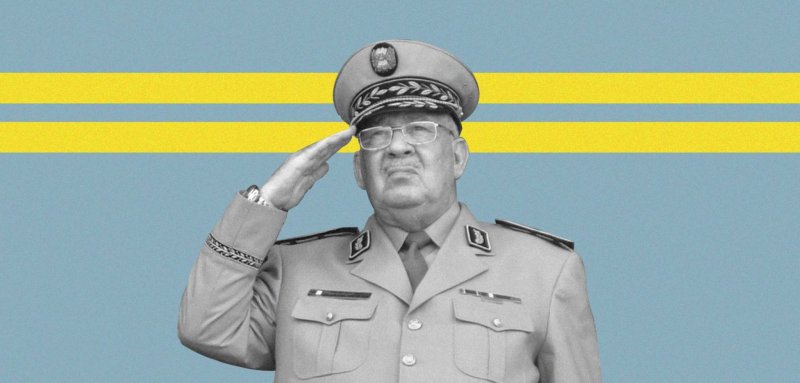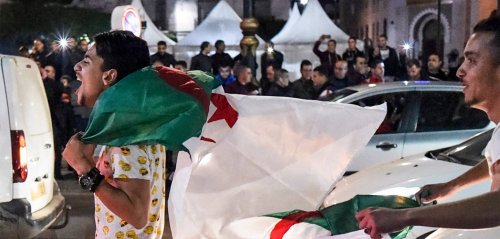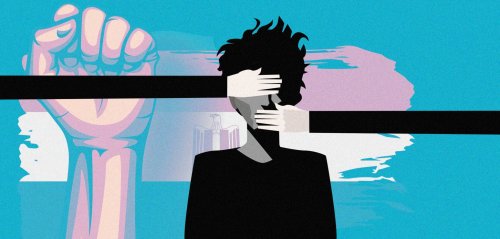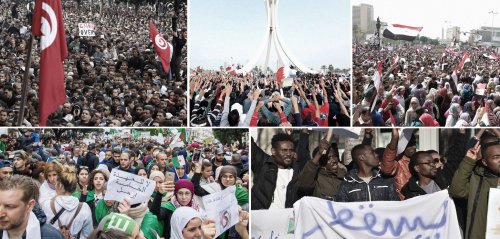His last message to President Abdelaziz Bouteflika on Tuesday had a powerful, even threatening tone: the implementation of the constitutional solution and for the president step down immediately.
The Algerian army’s chief of staff, General Ahmed Caid Saleh Abdelaziz, said this in a televised speech broadcast last Tuesday. Immediately afterwards, Bouteflika announced his resignation.
Who is Caid Saleh, the man who ordered Bouteflika to leave immediately, and confronted him after two months of popular protests? Does the Algerian street trust this man who was close to Bouteflika during his years of illness and did not object to the presence of the so-called "gang" around the president? Or is the specter of the Egyptian scenario making the movement in Algeria more alert to a possible seizure of power?
Who is Saleh?
Caid Saleh was born in Batna on January 13, 1940 and joined the Algerian Revolution in August 1957. He served in the National Liberation Army and obtained a degree from Vistriel Soviet Military Academy. Saleh took command of the Algerian ground forces in the bloodiest decade that Algeria ever experienced between 1992 and 2002, and fought against armed extremist groups.
In 2004, Bouteflika chose Caid Saleh as chief of staff, replacing Mohamed Ammari, who strongly opposed Bouteflika's second term.
His relationship with Bouteflika
Bouteflika's relationship with Saleh was one of trust, which led the president to appoint him in 2013 as deputy defense minister, transforming him essentially into a vice president. The Lieutenant General did not oppose Bouteflika when he decided to reduce the influence of the army's intelligence and security services after the head of the intelligence service, General Mohamed Madin, more commonly known as Tawfiq, retired in 2015. Some insiders believe that Caid Saleh was behind the move to sideline Tawfiq.
Tawfiq was not only an intelligence chief, but amassed vast power in the country, at one point earning the nickname "the Lord of Algeria". He disappeared for a time, but his name has returned to prominence amid the power struggles that emerged during the uprising.
Saleh's position
Caid Saleh’s relationship with the popular movement began on Feb 26, four days after the uprising was launched, when he began to threaten and intimidate those he claimed “call for violence and ignore those who want to live in security,” and questioned whether it was “reasonable to push Algerians towards the unknown through twisted calls that seem democratic but will cause insecurity and not be in Algeria’s best interests.”
Saleh's position was clear at first: to support Bouteflika's candidacy to a fifth term and to accuse the opposition of dragging the country into an uncertain future.
He said at the time that the People's National Army, by virtue of its constitutional duties, "considers anyone who calls for violence in any way, under any pretext and under any circumstance, to be ignorant of the desire of the Algerian people to live in safety and security."
Observers of Algeria noted that, shortly after this threatening message directed at the uprising, that this video of Saleh was erased from news websites and even state-owned television and radio withdrew it from their platforms after receiving orders from the army to do so.
Days later, Caid Saleh radically changed his position towards the uprising, from one orchestrated by “a deluded group” to declaring that the army was with the people.
Army resignations
Months before Bouteflika's announcement of a fifth term, there was an overhaul within the army and security. In September 2018, Bouteflika dismissed around 80% of the military leadership, including the commander of the ground forces, Major General Ahsan Tafer. The commander of the air force, Major General Abdelkader Lounas, was forced into retirement and five retired generals were placed on a travel ban.
Observers said at the time that this purge was not ordered by Bouteflika, but by Caid Saleh, and rumors abounded that the president’s brother, Said Bouteflika, was issuing decrees in the leader’s name.
This confirms that are are two powerhouses in Algeria: Bouteflika and Caid Saleh. Once erstwhile allies, the general instead moved to neutralize the president's brother before removing the president himself amid the uprising.
This explains the appearance of false news on the state-owned TV channel Al-Shorouk, two days before the overthrow of Bouteflika, calling for the dismissal of Saleh, to sow confusion among the army and the protesters. But it is clear that Saleh was more influential at that point than Said Bouteflika, since he had a tight grip on the armed forces, even though there are dissenting groups within the military.
After this false statement the Algerian state news service quoted the army chief of staff as saying after a meeting with senior officers: "There is no room for further wasting of time. The proposed constitutional solution of activating Articles 7, 8 and 102 should be implemented immediately in order for the state to continue operating with the legitimacy endowed upon it by the constitution.”
Saleh said: "Our decision is clear and irreversible, we stand with the people until the fulfillment of their demands in full.”
Saleh described those close to Bouteflika as "a gang that has built up huge fortunes in illegal ways and in a short time, without being called to account for it, exploiting their proximity to those in the centers of power.”
It was a clear reference to Bouteflika and his associates. But this so called “gang” has been operating under Saleh’s eye for years. One valid question is why does he now consider it a criminal gang?
Street vigilance
Caid Saleh intervened to force Bouteflika’s resignation, a move that was not met with praise by the protesters, but with was instead greeted with caution. The protesters did not give Saleh a mandate to speak in its name and control its outcome. Instead, immediately after the president stepped down, there were voices calling on demonstrators not to leave the streets until the rest of the symbols of the regime of Bouteflika stepped down.
The Egyptian scenario is strongly present in the minds of young people in Algeria, ever since Saleh assumed a moderate and accommodating tone towards the movement. The Egyptian scenario is the obsession of the Algerian street, which, in its slogans a few days ago, said that "there is no place for another Sisi in Algeria," apparently fully aware that the risks of such a scenario are real and serious.
Observers say that Caid Saleh overstepped his boundaries when he announced on April 2 that Bouteflika should step down immediately, because Bouteflika had announced days before he would leave office before April 28 to secure the functioning of state institutions. What made Saleh order him to resign before that date? Does he have the right to direct this warning to the president?
Many assert that Bouteflika had intended to assign former Algerian President Liamine Zeroual to secure the transitional phase after his resignation, a proposal backed by General Tawfiq and submitted to Said Bouteflika, rivals of Caid Saleh, a proposal that angered the military chief.
Media sources say Salih has used "forceful" tactics against those close to Bouteflika to prevent Zeroual from taking charge of the interim period.
Now that Bouteflika has been absent from the scene after two decades in office, many in Algeria still remember Salih's use of force against the opposition before he himself declared he was against a fifth term. Saleh was in 2013 a strong supporter of Bouteflika's candidacy for a fourth term as well, but threatened the uprising two months ago before opposing Bouteflika's fifth term.
So who can trust him now?
Raseef22 is a not for profit entity. Our focus is on quality journalism. Every contribution to the NasRaseef membership goes directly towards journalism production. We stand independent, not accepting corporate sponsorships, sponsored content or political funding.
Support our mission to keep Raseef22 available to all readers by clicking here!
Interested in writing with us? Check our pitch process here!






